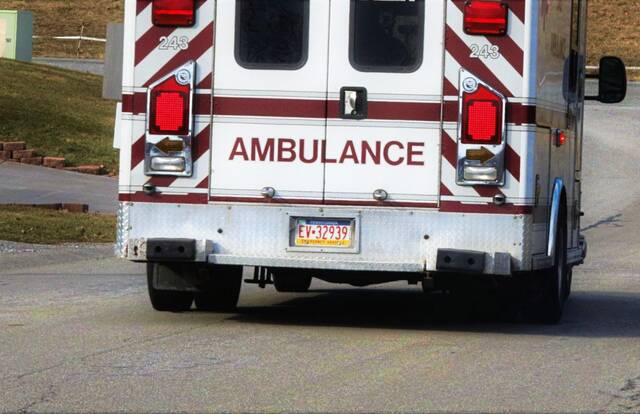https://staging.triblive.com/local/valley-news-dispatch/ems-providers-need-more-than-state-money-to-fix-funding-woes/
EMS providers need more than state money to fix funding woes

Regional ambulance service officials say they’ll try to grab a piece of increased state funding for emergency medical services, but repeated their plea for a new funding model.
“In a nutshell, the system has been collapsing for a good while,” said Brad James of Eureka Hose EMS in Tarentum.
The comment came at a recent meeting of EMS and state officials to discuss a proposed boost in state EMS funding hosted by Citizen Hose Company in Harrison.
A proposal for about $30 million more for ambulance companies is pending in the state House. It already passed the Senate.
“It is a crisis,” Ken Hellendall, an EMS consultant for the state Department of Community and Economic Development, said of the state’s EMS situation.
Hellendall, a retired director of Cheltenham EMS near Philadelphia, focused on EMS sustainability in particular.
“People think that everyone from DCED wants to go in and push mergers. I don’t,” he said, adding they simply do not work in a lot of places.
“Are there ways to combine resources? Hell, yes,” Hellendall said. “Think about working with your fire departments. Share resources.”
Among other partial solutions discussed was getting municipal officials to create dedicated EMS taxes and forming authorities that have the ability to bill customers and enforce collection of unpaid bills.
Hellendall said forming an EMS authority as an umbrella organization for multiple EMS services is one way to help tackle the problem.
“Authorities can bill,” he said. “Authorities can do such things as management.”
Hellendall emphasized that local EMS chiefs do not necessarily have to lose their authority or control by forming an authority.
He pointed to the Municipal Emergency Services Authority, which took over EMS services in Northwestern Lancaster County in January and is the first EMS authority in the state authorized to levy an annual fee.
The fee can be a mandatory one that households and businesses in an area would have to pay, like a water or sewage bill.
Most EMS services already ask for an annual membership, but those can be ignored with no repercussions. They are more like donations.
Getting local residents to subscribe to the EMS service through an annual fund drive, critical to keeping the ambulances running, is daunting.
Statewide, the average participation is only 30% to 35%, Hellendall said.
James said the best fund drive Eureka conducted was 10 years ago when 38% of the service area households paid for subscriptions.
“It’s a hard thing for the public (to understand) because when they call for somebody having chest pains, they expect (an ambulance) to show up,” said Gino Mollica of Foxwall EMS.
Collecting transport fees from reluctant patients who think their insurance covers the ambulance trip to the hospital is another difficult challenge.
“We might get half of what we bill, and we get it six months later,” James said of the reimbursements.
He recalled an incident where Eureka took a cardiac patient from Fawn to Allegheny General Hospital in Pittsburgh.
“That’s a $1,900 bill, and our reimbursement was $149,” he said.
“It costs the municipality and the company more to go after it than it’s worth,” said Al Fisher of Citizens Hose EMS in Harrison.
“When they haven’t paid their bill and an ambulance still shows up, what does that tell them?” Mollica said.
In Hellendall’s opinion, that is where having an authority can help.
“If you have an ambulance authority bill, you are more likely to pay it,” he said, referring to subscription fees as well as unpaid transports.
Another important matter is keeping the line of communication open between the EMS service and the municipalities. He said being transparent about operational costs as well as collection problems and the need to raise salaries in order to retain staff is necessary to get municipal officials involved in finding solutions.
Those solutions might include dedicating a half-mill or a full mill of property taxes to fund EMS services or getting the municipality to pay for utilities or fuel or handle EMS billing, he said.
When presenting their case to municipal leaders or even the public, Hellendall said EMS officials must be prepared to demonstrate their needs.
“How many times did you go (to the hospital)? What did you bill? How much were you paid?” he said. “Go in there with the facts.”
He said providing EMS services should be a concern for local municipal leaders as well as the EMS personnel.
“This is an elected municipal officials’ headache,” Hellendall said. “You are responsible for providing EMS in your community.”
“We’re talking about saving lives here so politics have to go away,” he continued. “You can’t let politics get involved, please.”
Jim Erb of Citizens, who also is a Harrison commissioner, said the EMS services have been working together and will continue to do that.
“The goal, of course, is to have very open communication with our municipal leaders,” he said.
Even if the increased state funding bill is passed, EMS services need to be proactive to get a piece of it.
State Rep. Mandy Steele, D-Fox Chapel, said that will require cooperation among EMS services and municipalities.
“What we’re hoping is that every company gets together with their municipality and figures out a plan,” Steele told the gathering. “I don’t know what our best path forward is, but it’s going to take the state, the municipalities and the EMS services to figure it out.”
Copyright ©2026— Trib Total Media, LLC (TribLIVE.com)
